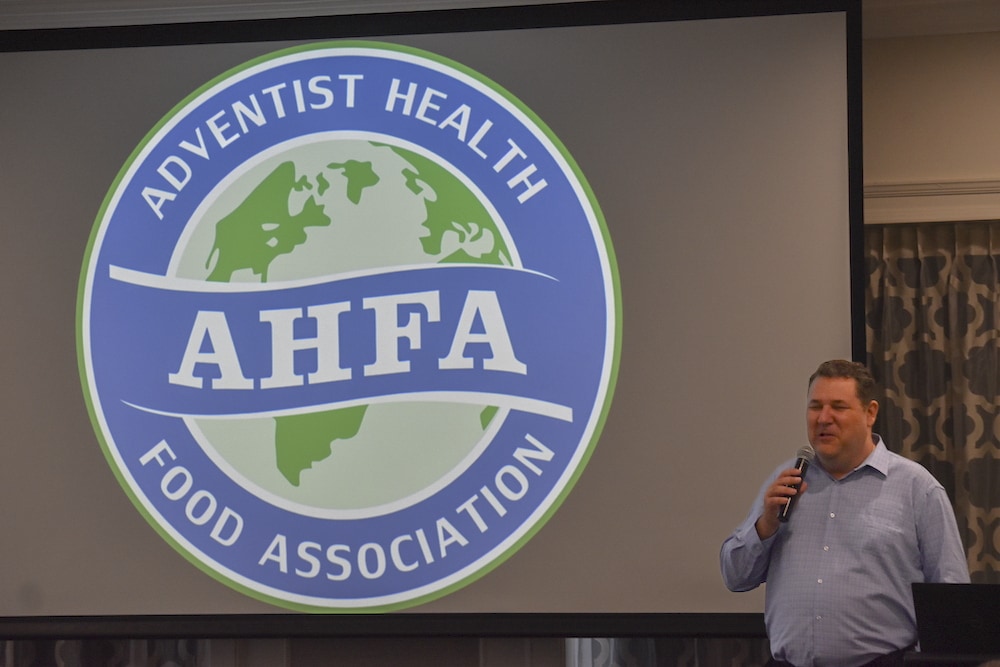
Not even the impending arrival of Cyclone Gabrielle prevented dozens of members of the Adventist Health Food Association (AHFA) from making their way to Auckland, New Zealand, on February 12, 2023.
The association, which connects food factories managed by the Seventh-day Adventist Church around the world, is meeting for the first time in person after the COVID-19 pandemic.
Under the theme “Connect, Reflect, Thrive,” food factory executives from Australia, Germany, Korea, Peru, and a dozen other countries are spending from February 12 to 17 listening to performance reports, getting updates on best practices, and reflecting on experiences, challenges, and opportunities for the health food industry around the world.
Besides the well-defined professional components of the event, participants share the common stated goal of supporting the Adventist Church’s mission of helping people live full, wholesome lives. In that spirit, the 2023 AHFA conference kicked off with devotionals that called Adventist food managers to reflect and connect with God.
In the opening program, after the customary welcome in the Māori language, Sanitarium Health and Wellbeing Australia CEO Kevin Jackson introduced New Zealand Union Conference president Edward Tupa’i. Tupa’i drew from his parents’ and others’ experiences as gardeners to reflect on the power of faith in any personal, family, or business enterprise.
An Act of Faith
“Have you ever planted a seed in the soil and had the opportunity to see that plant grow?” Tupa’i asked, referencing Jesus’ illustration of the mustard seed (Mark 4:30-32). “Have you seen it becoming a tree? Have you seen birds coming to the branches of the tree to find protection?”
Tupa’i shared how his parents immigrated from Samoa to New Zealand decades ago. In their new country, they purchased a property where they planted trees and plants. As a child, Tupa’i saw firsthand the joys and challenges of gardening. “Gardening is like heaven on earth,” he said. “But gardening is an act of faith.”
Moreover, every step involved in gardening originates in God. “God gives us the seed, the knowledge for planting and caring for the plant. All are God-given,” Tupa’i said.
He also shared the experience of Tui Ridge Park, a 170-hectare (420-acre) property in Rotorua that the Adventist Church in New Zealand purchased more than 30 years ago. In that place, Adventist scientists and members planted seeds. It became a beautiful park. “It is the spiritual home of the Seventh-day Adventist Church in the North Island,” Tupa’i said. “A place to visit and find God.”
As a conclusion, Tupa’i asked participants, “What is your small mustard seed challenge? What will be our small act of faith this week?”
In the Midst of Storms
The first full day of conference presentations and discussions on February 13 also began with a spiritual reflection, this time by Sanitarium New Zealand chaplain Keira Bullock. Bullock, who presented online after a weather-related flight cancellation, reflected on the significance of “living in the middle,” a place that is “not the beginning nor the end.”
“I am not a big fan of ‘the middle,’ ” she said, explaining that the term includes those delays and detours that are a regular part of life. “We like to get things done, check things off … get to the finish line.” Living in the middle, Bullock said, can be tedious, frustrating, and even painful. “But the truth is, most of our time is spent in the middle,” she added, referring to the examples of a marathon, a diet, or a long-haul flight.
Drawing from the life of the apostle Paul, someone she described as “a very task-oriented individual himself,” Bullock explained that in his life journey, “he encountered incredible detours and pretty intense middles.”
She explained how, in Acts 27, Paul’s “middle” included a storm, a big detour, and a shipwreck. “Storms are powerful, and storms can distract us,” she said. “Storms can take away our sense of hope, of purpose.” Darkness can affect us negatively too. Bullock called participants to trust God instead. “He is the God of the beginning and the end; because of that, we can trust Him with the middle chapters of our lives,” she said.
And, she added, “No matter what storm we are going through, God is in our business, in our lives, and in our families. It’s hard, but when we are in the middle of the journey, the storm, the fearful darkness, it could be our invitation to come back to [His] light.”
Bullock’s presentation seemed an apt beginning to the conference as the outer rings of Cyclone Gabrielle closed in over Auckland.
Last updated February 15, 2023.